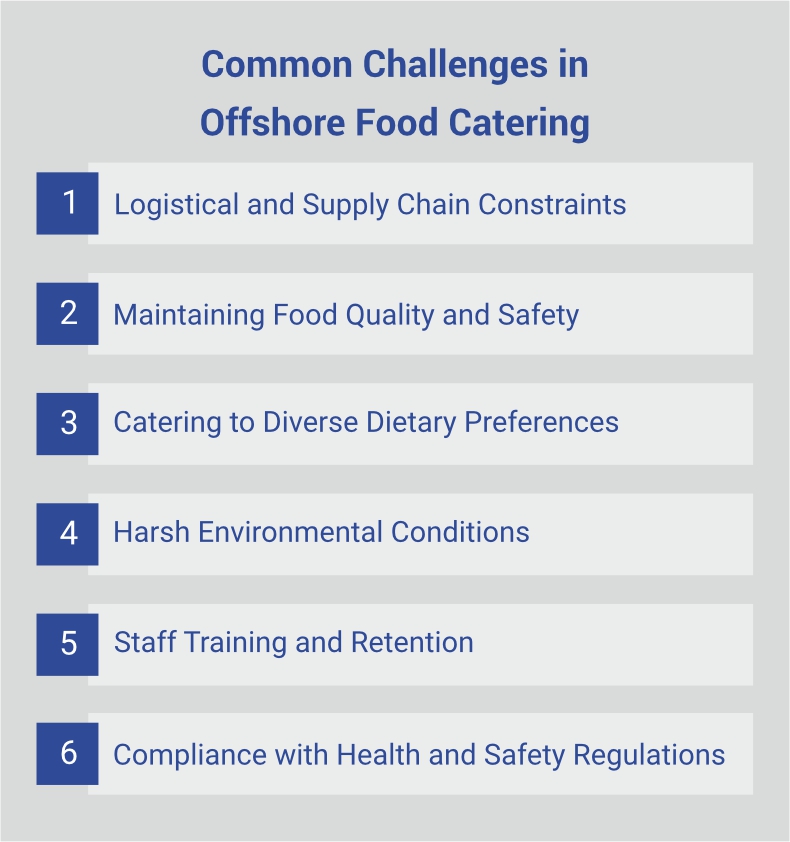Introduction:
Offshore food catering in India’s food service industry plays a critical role in ensuring the well-being and productivity of workers in remote locations such as oil rigs, merchant ships, and floating production storage and offloading (FPSO) units. Catering services in offshore environments face unique challenges due to harsh working conditions, logistical constraints, and regulatory compliance. Despite these challenges, successful catering programs have managed to provide nutritious, high-quality meals that meet the diverse dietary requirements of workers. This blog explores the major challenges in offshore food catering and provides practical solutions, including real-world case studies from the Indian offshore service sector.
Common Challenges in Offshore Food Catering

1. Logistical and Supply Chain Constraints
One of the biggest challenges in offshore catering is the difficulty in sourcing, transporting, and storing food supplies. Offshore locations are often hundreds of miles away from the mainland, and unpredictable weather conditions can delay shipments, leading to food shortages.
- Establishing robust supply chain agreements with multiple vendors to ensure a steady supply of food items.
- Implementing proper inventory management and forecasting techniques to predict demand and avoid wastage.
- Investing in high-quality food preservation techniques, such as vacuum packaging and freezing, to maintain food quality for extended periods.
2. Maintaining Food Quality and Safety
Food safety is critical in offshore environments where medical assistance is limited. Any lapse in hygiene or food handling can lead to foodborne illnesses, affecting the productivity and health of offshore workers.
- Adhering to international food safety standards such as HACCP (Hazard Analysis and Critical Control Points) to minimize contamination risks.
- Regular staff training in hygiene practices, proper food handling, and storage procedures.
- Deploying temperature-controlled storage and cooking equipment to ensure proper food preparation.
3. Catering to Diverse Dietary Preferences
Offshore workers come from diverse cultural backgrounds, each with unique dietary preferences and restrictions. Failing to cater to these preferences can result in dissatisfaction and lower morale among employees.
- Creating customizable meal plans that consider religious, vegetarian, vegan, and allergen-free diets.
- Conducting regular feedback surveys to understand workers’ preferences and adjust meal options accordingly.
- Employing trained nutritionists and chefs to ensure meals are both balanced and culturally appropriate.
4. Harsh Environmental Conditions:
The offshore environment presents unique challenges, including extreme weather, high humidity, and salt exposure, which can affect food quality and storage.
Solution:
- Using corrosion-resistant storage units and kitchen equipment to withstand harsh conditions.
- Installing humidity and temperature control systems in food storage and preparation areas.
- Implementing backup generators and alternative energy sources to maintain refrigeration in case of power failures.
5. Staff Training and Retention
Catering staff on offshore sites must be well-trained to handle high-pressure environments and follow strict health and safety protocols. However, high attrition rates in the industry can lead to inconsistency in service quality.
Solution:
- Offering competitive salaries and benefits to attract skilled workers.
- Conducting regular training sessions on culinary skills, safety protocols, and customer service.
- Implementing reward and recognition programs to boost morale and retain experienced staff.
6. Compliance with Health and Safety Regulations
Offshore catering operations must comply with national and international safety standards, including those set by the Food Safety and Standards Authority of India (FSSAI) and the International Maritime Organization (IMO).
Solution:
- Ensuring regular audits and inspections to maintain compliance with safety standards.
- Conducting health and safety training programs for all catering personnel.
- Using digital compliance dashboards to monitor and document adherence to food safety regulations.
Case Studies of Successful Offshore Catering Programs in India
Case Study 1: Managing Dietary Diversity in an Offshore Catering Contract for an Oil Rig
Challenge: The client, a multinational oil corporation, had employees from various nationalities with specific dietary restrictions, making it difficult to standardize meal plans.
Solution: The catering team conducted a detailed dietary survey and designed a menu that included Indian, continental, and Middle Eastern cuisine. A dedicated team of chefs was assigned to prepare meals based on religious dietary requirements, including halal and vegetarian options.
Outcome: This initiative increased employee satisfaction rates by 30% and improved workforce morale, leading to higher productivity and lower turnover rates among offshore workers.
Case Study 2: Overcoming Logistical Challenges for an Offshore Catering Operation in the Arabian Sea
Challenge: Due to unpredictable weather conditions, food supply shipments were often delayed, leading to disruptions in meal service.
Solution: The catering provider introduced a contingency plan that included emergency food reserves stored in climate-controlled units. In addition, they formed partnerships with multiple suppliers to ensure alternate delivery routes in case of supply chain disruptions.
Outcome: The strategy significantly reduced instances of food shortages and ensured uninterrupted catering services, even during extreme weather conditions.
Conclusion
The offshore food catering services industry in India faces numerous challenges, from supply chain disruptions to food safety concerns and workforce retention issues. However, through strategic planning, technology adoption, and adherence to strict safety regulations, these challenges can be effectively managed. The case studies above highlight how successful offshore catering programs can lead to increased worker satisfaction, improved operational efficiency, and long-term sustainability in the offshore service industry.
As offshore energy exploration and maritime industries continue to expand in India, the demand for high-quality catering solutions will only grow. Companies that invest in innovative solutions and prioritize worker well-being will set new benchmarks in offshore catering excellence. By learning from successful programs, offshore food service providers in India can enhance their offerings and contribute to the overall productivity and morale of offshore workers.
Industries we serve:
Automobile | Manufacturing | Pharmaceutical | Oil and Gas | Healthcare | Ancillary | FMCG | Education | Real Estate | Commercial | Mining | Hotels
Also read: Employee Training and Development in Industrial Catering

